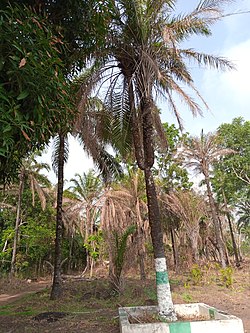This article has multiple issues. Please help improve it or discuss these issues on the talk page . (Learn how and when to remove these messages)
|
Isi Uzo | |
|---|---|
Local Government Area | |
 Palm tree from Ikem, located within Isi Uzo. | |
| Coordinates: 6°47′N7°43′E / 6.783°N 7.717°E | |
| Country | |
| State | Enugu State |
| Government | |
| • Local Government Chairman | Obiora Obeagu (PDP) |
| Area | |
• Total | 877 km2 (339 sq mi) |
| Population (2006 census) | |
• Total | 148,415 |
| Time zone | UTC+1 (WAT) |
| 3-digit postal code prefix | 412 |
| ISO 3166 code | NG.EN.IU |
 | |
Isi Uzo (also Isi-Uzo) is a Local Government Area (LGA) of Enugu State, Nigeria bordering Benue State and Ebonyi State. [1] The largest city within Isi Uzo is Eha-Amufu, and the region is host to 23 autonomous communities with its capital in Ikem and the oldest town is Umualor (Umuero). [1] After independence, the local government area was created in 1976. Isi-Uzo is a constituent of the Enugu East Senatorial District and has a population of approximately 220,000. [1]
Contents
- History
- Pre-Colonial Period
- Recent History
- Religion
- Odo Masquerade
- Notable people
- Demographics
- References
Isi Uzo has an area of 877 square kilometers and a population of 148,415 (from the 2006 census), however modern estimates set the population at around 220,000. [1] The LGA is a primarily rural region that relies heavily on local agribusiness initiatives for economic growth. [1] The government area has over sixty local markets used for commerce, and the area's postal code is 412. [1] [2]

